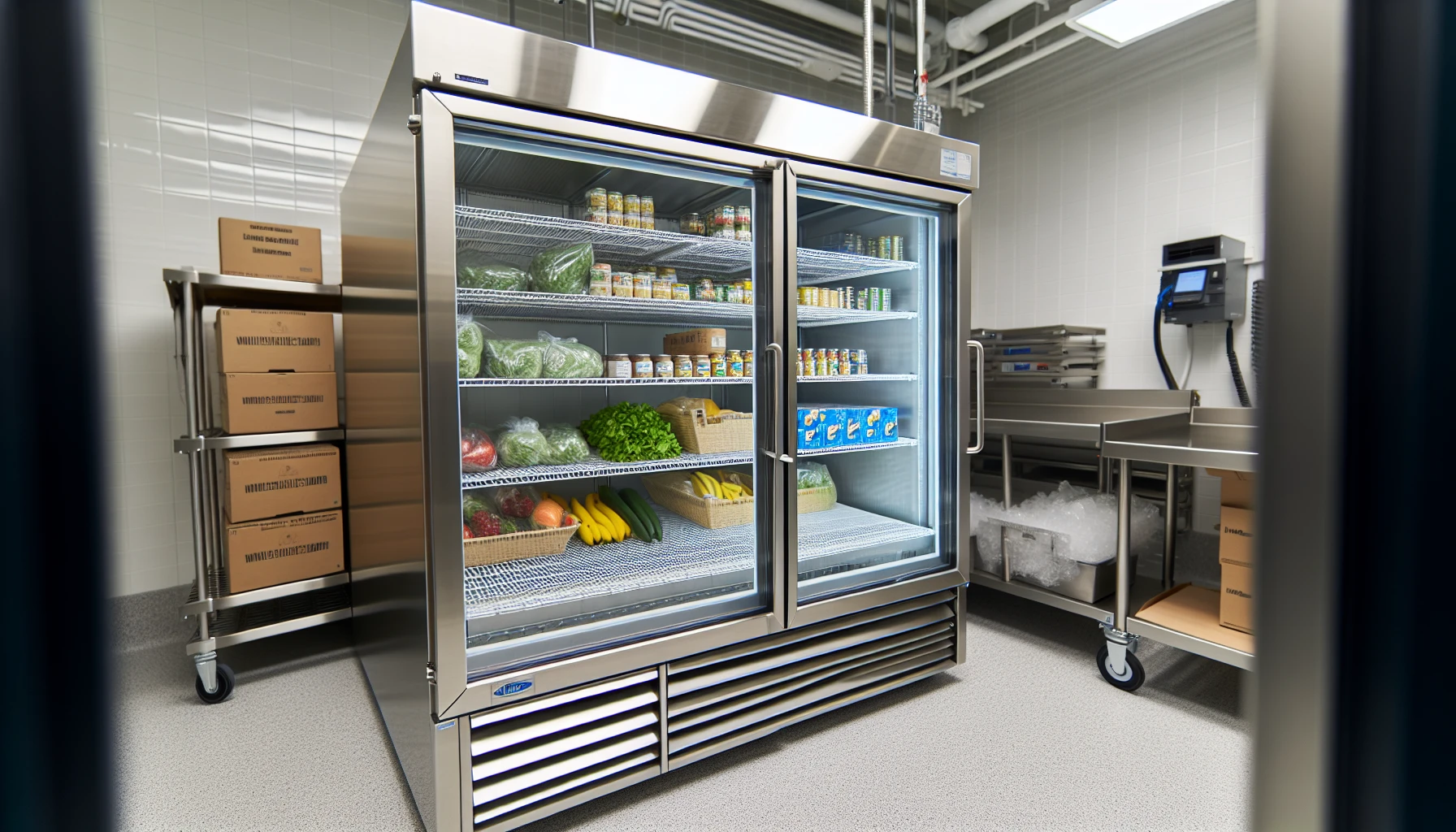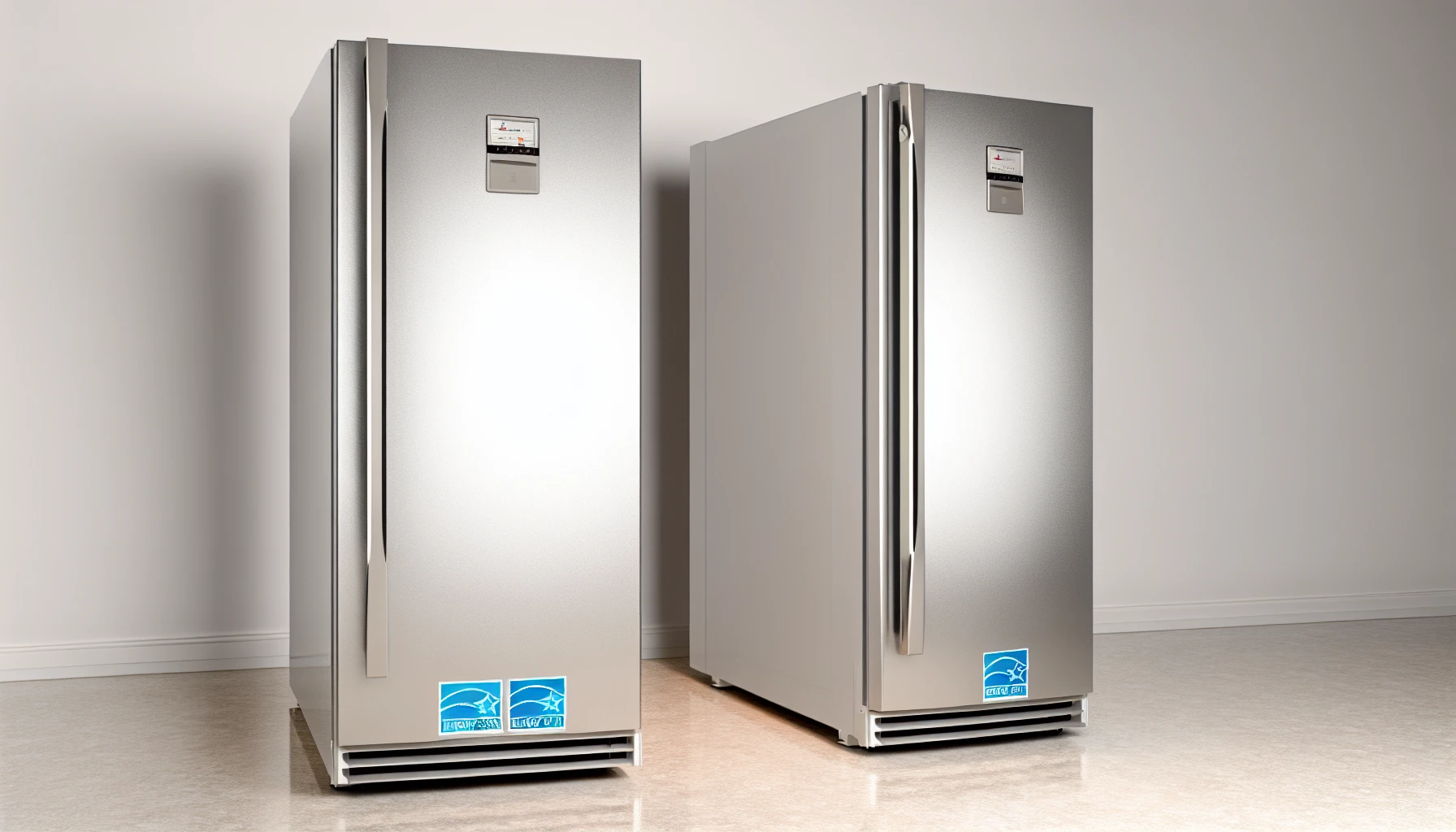Add products by adding codes
Essential Tips on How to Choose a Refrigeration Unit that Fits Your Needs

By factoring in criteria such as storage capacity, temperature regulation, size specifications for installation and upkeep needs, businesses can make an educated choice when selecting a refrigeration unit that’s best suited to them. With this blog post, we’ll take you through the process of how to pick out the most efficient model with regard to energy consumption and be equipped enough to produce an informed decision beneficial for your business.
Key Takeaways
-
Evaluate business requirements to determine ideal refrigeration system.
-
Consider storage capacity, product types and customer accessibility when selecting a unit.
-
Investigate energy efficiency, temperature control and installation for optimal performance & cost savings.
Evaluating Your Business Requirements
It is critical to evaluate your business’s needs before choosing a commercial refrigeration system. Knowing the key factors that determine what type of commercial refrigeration unit would suit you best puts you in an advantageous position.
Firstly, it’s essential to analyze storage capacity for perishable goods as well as estimate future demand. Utilizing cold storage if needed. Secondly, take into consideration all product types and their respective temperature/humidity demands when selecting a refrigerator unit. Lastly, don’t forget about space available and customer accessibility - having easy access with an aesthetically pleasing design allows efficient use of interior space both from customers’ point-of-view or from behind the counter.
Storage Capacity
When selecting a refrigeration unit, businesses should account for their present and future needs to ensure they don’t underestimate the necessary storage capacity. Failing to do so can lead to inadequate space, decreased shelf life of perishables and costly repair costs.
So it’s crucial that companies assess all relevant factors such as type of food items, quantity and desired conditions thoroughly in order to decide on an appropriate refrigerator unit which will be able to fulfill both current and upcoming demands effectively with no hassle or extra cost associated with maintenance down the line.
Product Types
For optimal freshness and safety, it is important to choose a refrigeration unit that can effectively support the different temperature and humidity needs of individual products. Perishables should be avoided. Be stored at temperatures below 45°F while cool goods are best kept under 41°F. If you offer an assortment of items in your store, then specialized units such as deli cases may have to be employed for certain types so they remain up-to-standard when held in the specific conditions required by each product type. Knowing what level of refrigeration you need helps ensure proper maintenance across all goods within these vital cooling units.
Customer Accessibility
Ensuring customers and employees have easy access to refrigeration units, including walk in coolers, is essential for businesses that are customer-oriented, such as restaurants and supermarkets. To ensure maximum accessibility when selecting the unit. Features like self-closing doors, temperature controls which can be adjusted without difficulty plus adjustable shelving should all be taken into account. This will not only provide convenience, but it also encourages satisfaction from both parties involved over time, leading to loyalty among consumers. Automatic defrosting mustn’t be neglected either due to its necessity within these types of units giving a much better experience overall.
Exploring Different Types of Refrigeration Units

When it comes to your business’s refrigeration needs, having an in-depth understanding is essential before you make a purchase. Refrigeration units come in all shapes and sizes - from cool rooms for large-scale storage, to upright freezers that save on floor space or under bench fridges tucked away beneath counters. Even display refrigerators allowing customers easy access and visibility of products. Investigating the different commercial refrigerator options available can help ensure you select the most suitable unit for your company’s requirements.
By doing research into each type of product out there, not only will this aid decision making, but also enable maximum benefit being reaped by choosing one tailored to specific needs – such as maximizing customer access through Display Fridges while keeping cost efficiency with Upright Freezers working well within confined spaces ideal when refurbishing existing premises. Cool Rooms are perfect if extended long term usage conditions require larger cold capacity solutions while Under Bench provides subtle serviceable facilities without compromising aesthetic resources which are often important factors during fit outs situation management situations like restaurant upgrades etc.
Energy Efficiency and Cost Savings

When selecting a refrigeration unit, businesses should prioritize energy efficiency in order to realize cost savings and reduce their environmental impact. When assessing the efficiency of these units, several factors need to be taken into consideration including Energy Star ratings as well as long-term costs such as operation expenses, maintenance needs and replacement parts. Making an informed decision on energy efficient equipment will benefit your business both financially in the long run and also support sustainability efforts for the environment.
Energy Star Ratings
Looking for a refrigeration unit with improved energy efficiency? Check the Energy Star rating as these units have been tested and proven to be up to 40 percent more efficient compared to standard models. The cost savings will add up over time, resulting in lower running costs than usual. Selecting a highly rated model ensures maximum performance while keeping operating expenses low – so you won’t regret your investment!
Long-term Cost Analysis
It’s critical to consider the long-term expenditure of owning a refrigeration unit, such as energy consumption costs, maintenance charges and replacement parts expenses. Investigating these outlays will assist in choosing an effective yet economical equipment that meets your business needs.
Energy efficient units may have higher initial prices but could result in considerable cost savings down the line due to their reduced power usage together with lower servicing fees. By carrying out a detailed analysis on future expenditures you can ensure that your chosen cooling system (including its condensing part) furnishes optimum returns for your investment.
Temperature Control and Optimal Performance
To ensure a refrigeration unit runs smoothly and maintains the optimal temperature for your perishable goods, attention should be paid to different factors that play an important role. This includes thermostats, controllers, and expansion valves, which are necessary in ensuring consistent temperatures as well as avoiding spoilage of products.
By focusing on attaining precise temperature control with excellent performance levels from the refrigerator itself, you can guarantee there will be minimal waste while keeping inventory freshness intact at all times.
Thermostats and Controllers
For optimal maintenance of the desired temperature within a refrigeration unit, it is essential to have reliable thermostats and controllers. These components provide an automated control system which regulates temperatures inside by activating or deactivating cooling as necessary. To ensure consistent temperatures are kept up, one should select models with digital thermostats that offer improved precision over more traditional mechanical versions. By choosing a model equipped with high-quality controls for both the heating and cooling systems in your refrigeration unit, you can prevent any spoilage due to poor regulation of its internal climate.
Expansion Valves
The expansion valves found in refrigeration systems have a major role when it comes to managing and sustaining the optimal temperature within these units. Refrigerant travels through the valve, transitioning from liquid form into vapor, so as to help with cooling.
It is important that you consider both the type and quality of any such component before selecting your refrigeration system since higher-grade valves are advantageous for successful regulation of temperatures where perishable items must be stored at accurate levels.
Proper Sizing and Installation

For the best performance of your refrigeration unit, it is critical to make sure it’s correctly sized and installed. Start by assessing the height, width and depth of where you plan on putting in place this appliance. Keep clearance dimensions as stated by its manufacturer in mind too. To ensure proper setup, go for professional installation services- doing so guarantees correct implementation with an eye towards maximum efficiency avoiding any potential malfunctions stemming from incorrect placement.
Measuring Available Space
Before you purchase a refrigerator, it is important to measure the area of your business that will house this unit. This means taking note of its width, height and depth as well as considering any potential developments in space requirements that might be required down the line.
By measuring correctly and assessing long term needs, you can make sure to choose a refrigeration unit which fits perfectly within your existing facility, both regarding size and storage capacity. In doing so, you guarantee an efficient process for accommodating current stock levels or future increases accordingly!
Professional Installation
A professional installation of your refrigeration unit is a wise choice that can help guarantee the best performance and avoid potential issues. With their specialist expertise and experience, a qualified installer has what it takes to put in your system right with reduced danger of any leaks or temperature control irregularities. You are able to benefit from some extra advantages like cost savings on tools & materials, quicker completion time without safety risks as well as longer efficiency and protection for both warranty & operation effectiveness. Employing an experienced technician brings you better quality output but also extended life span at no additional charges compared to DIY solutions which may be more prone to mistakes leading up inefficient functioning outcome or other associated problems such as delays due to unexpected events arising throughout work course etc. Hence opting for expert service guarantees its optimal execution along with premium benefits worth every penny!
Regular Maintenance and Servicing
Regular maintenance of your refrigeration unit is a great way to ensure it will have a longer lifespan, and can help you avoid spending money on more expensive repairs. Keeping up with servicing also helps in conserving energy as the efficiency of the machine increases. Leading to decreased bills for electricity costs. Prioritizing regular upkeep should be an important focus when running any business that requires use of such units. Doing this means making sure performance remains at its best over time, maximizing returns while avoiding costly breakdowns or replacements. Down the line.
Preventive Maintenance
Maintaining your refrigeration unit in optimal condition requires a preventive maintenance plan. This is an effective way to identify and tackle any potential problems before they become expensive or dangerous. Regular inspections, cleaning, and servicing of the appliance will ensure its energy efficiency as well as enhance performance while prolonging its lifespan. Saving you money on costly repairs that may result from neglectful upkeep over time.
To maintain quality assurance for stored items within the refrigerator space, we must stick with this regular routine - including diagnosis of minor issues prior to escalation into severe malfunctions which would take much longer (and more cash) to fix eventually. It can be said that proactive approach towards caring for your refrigeration unit comes down to monitoring closely so as not suffer avoidable expenses due to reduced performance accuracy in future times ahead!
Service Contracts
Regular maintenance of your commercial refrigeration systems, including the unit and air conditioning, is vital for businesses to ensure ongoing efficiency. A service contract can help save on costs by providing priority services such as cleaning, inspections, emergency calls and preventative visits all in a convenient manner with easy-to-manage reminders/appointments. This offers peace of mind that the correct procedures are being followed while also enjoying other benefits like time saving repairs or lower cost part replacements when needed too. It helps guarantee comfort for those within a space filled with chilled goods or beverages, which in turn should be beneficial to any business financially speaking!
Making an Informed Decision
When selecting a refrigeration system for your company, it is important to evaluate all the factors. This includes assessing storage needs, energy efficiency requirements, temperature control capacities and sizing of the unit, as well as installation and maintenance considerations. Taking time to assess each one of these points can help you make an educated decision about which refrigerator would best suit your business’ demands.
Remember that picking out the right freezer has huge potential in helping grow success within any organization - utilizing this advice should enable you confidently choose a model optimal for meeting both current & future needs while at peak operation levels with minimum repair costs associated with it down the line.
Summary
Choosing the right refrigeration unit is imperative for any business, and making an informed decision by taking into account factors such as storage capacity, product type, energy efficiency, temperature control required size and installation requirements is key to success. Properly utilizing a well-maintained unit with precise temperature control guarantees quality preservation of perishable goods which leads to increased profits for the business in question.
Frequently Asked Questions
How do I choose a refrigeration system?
When selecting a refrigeration system, ensure the unit’s capacity and efficiency can meet your requirements. Take into account all aspects of the systems so that it functions optimally for you. Make sure to look out for any anomalies in responses gathered from web sources too. Pay special attention to words like ‘refrigeration’, ‘system’ and ‘unit’. Capacity is an important factor when choosing such a system. Make sure it will be powerful enough before using it.
What are the four characteristics to consider when choosing a refrigerant for a system?
Consider energy efficiency, cost-effectiveness and safety for the application as well as its environmental impact are all essential factors to be taken into account when selecting refrigerants. All four of these variables must be carefully weighed in order to make an informed decision.
What are the criteria for selecting a refrigeration compressor?
When picking out a refrigeration compressor, it is critical to bear in mind key factors such as size, type, cost effectiveness and noise levels for an ultimate performance outcome and prolonged success. Evaluating energy efficiency should also be considered when deciding on the best option available.
How do you size a refrigeration system?
When sizing a refrigeration system, take into account the atmosphere temperature, product temp., how many times doors open and target holding temperature. All of these factors must be carefully evaluated in order to accurately select an appropriate size.
What should I consider when selecting a commercial refrigeration system?
When considering the purchase of a commercial refrigeration system, one should think about several factors such as capacity for storage, energy efficiency and temperature control. The type of products it is intended to store must be taken into account when sizing the right unit. Installation procedures and ongoing maintenance requirements should not be overlooked when choosing a suitable suitable product.
